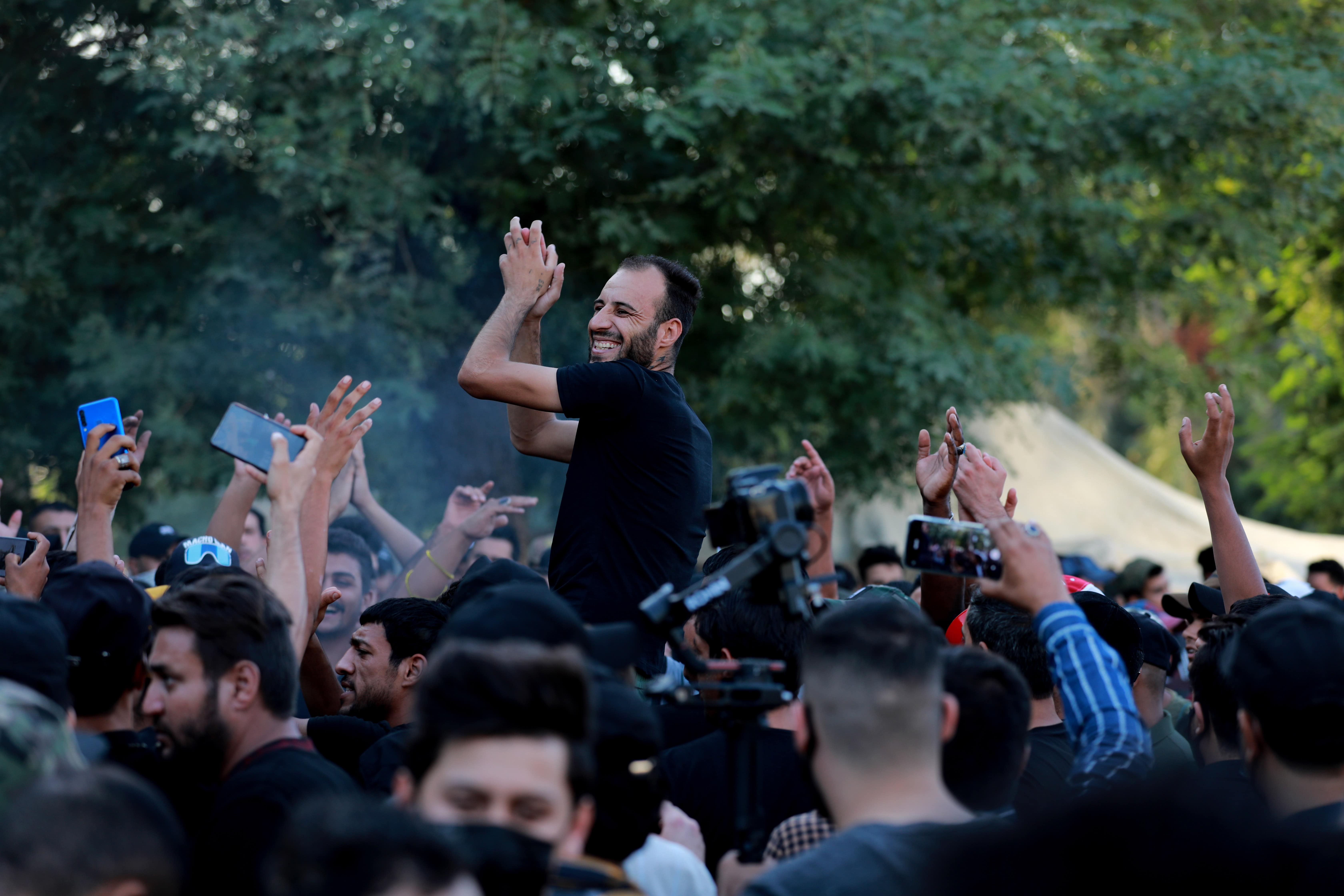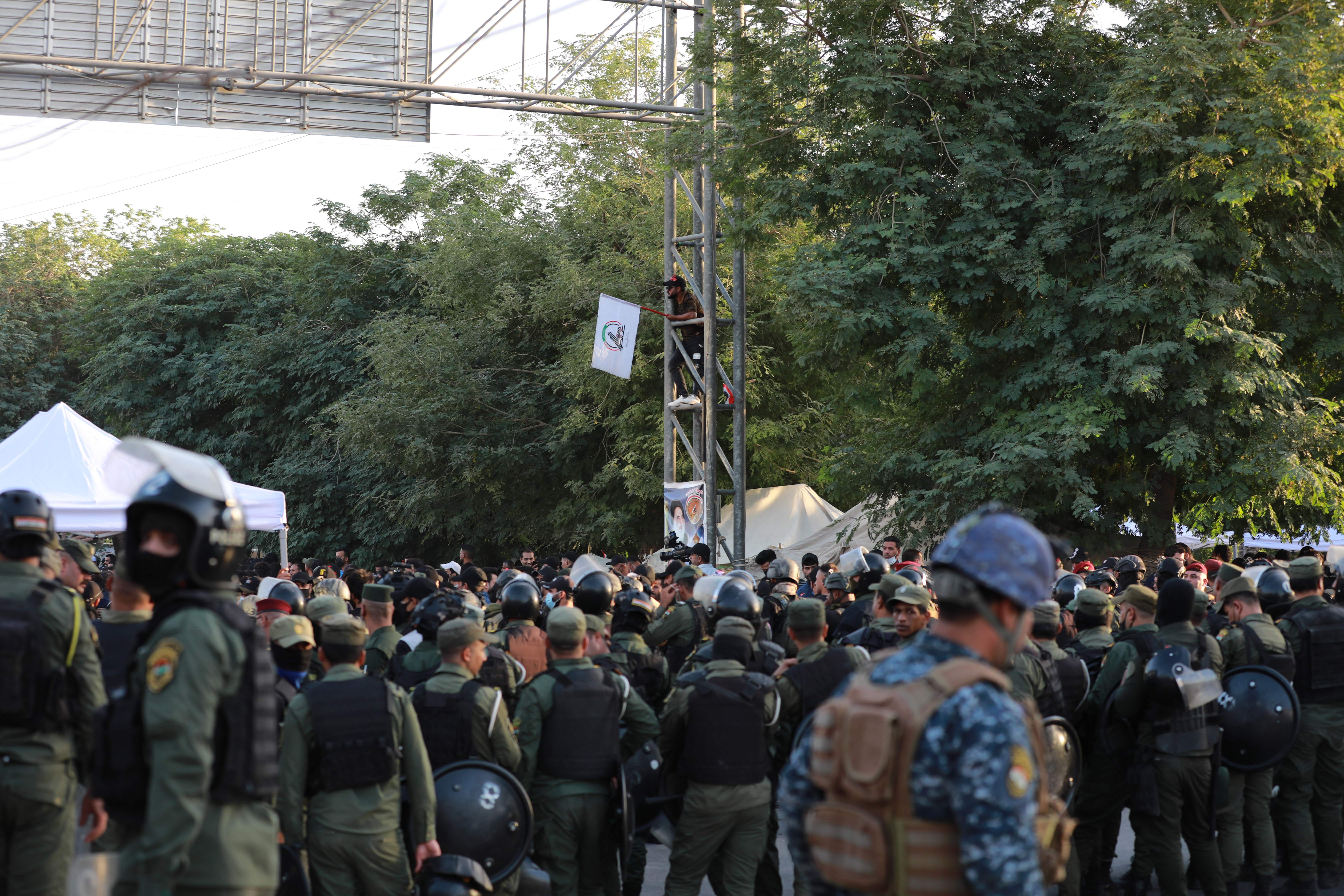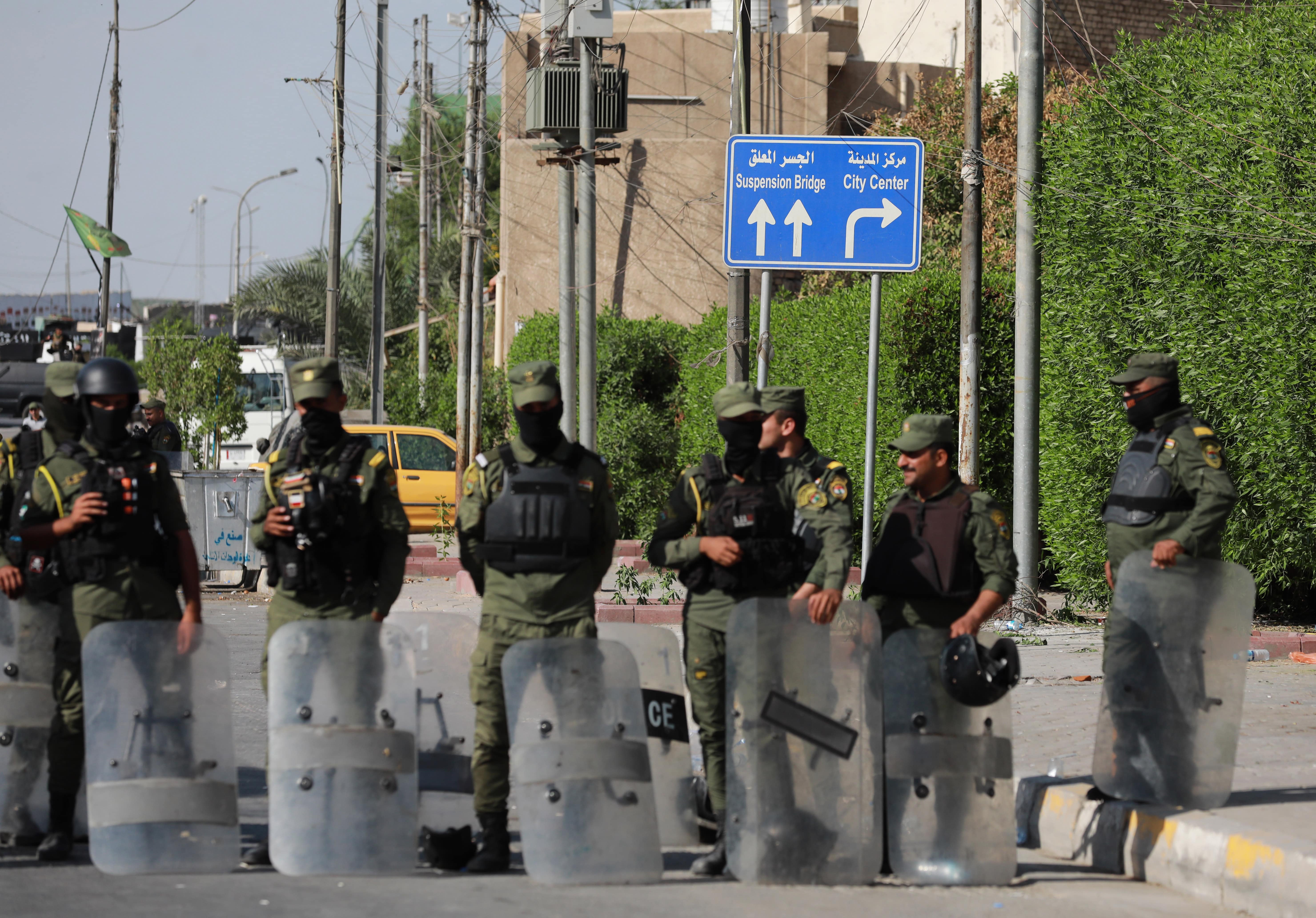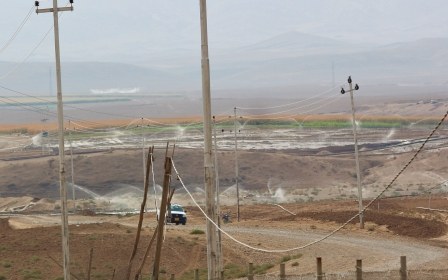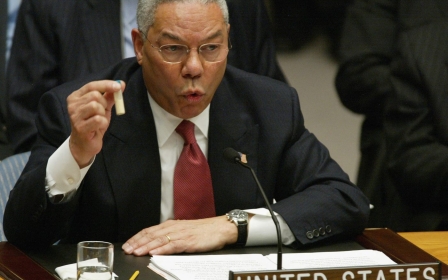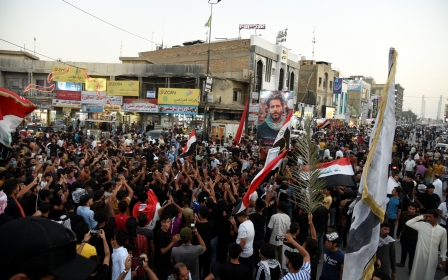Iraq elections 2021: Iran-backed groups rally in Baghdad against early results
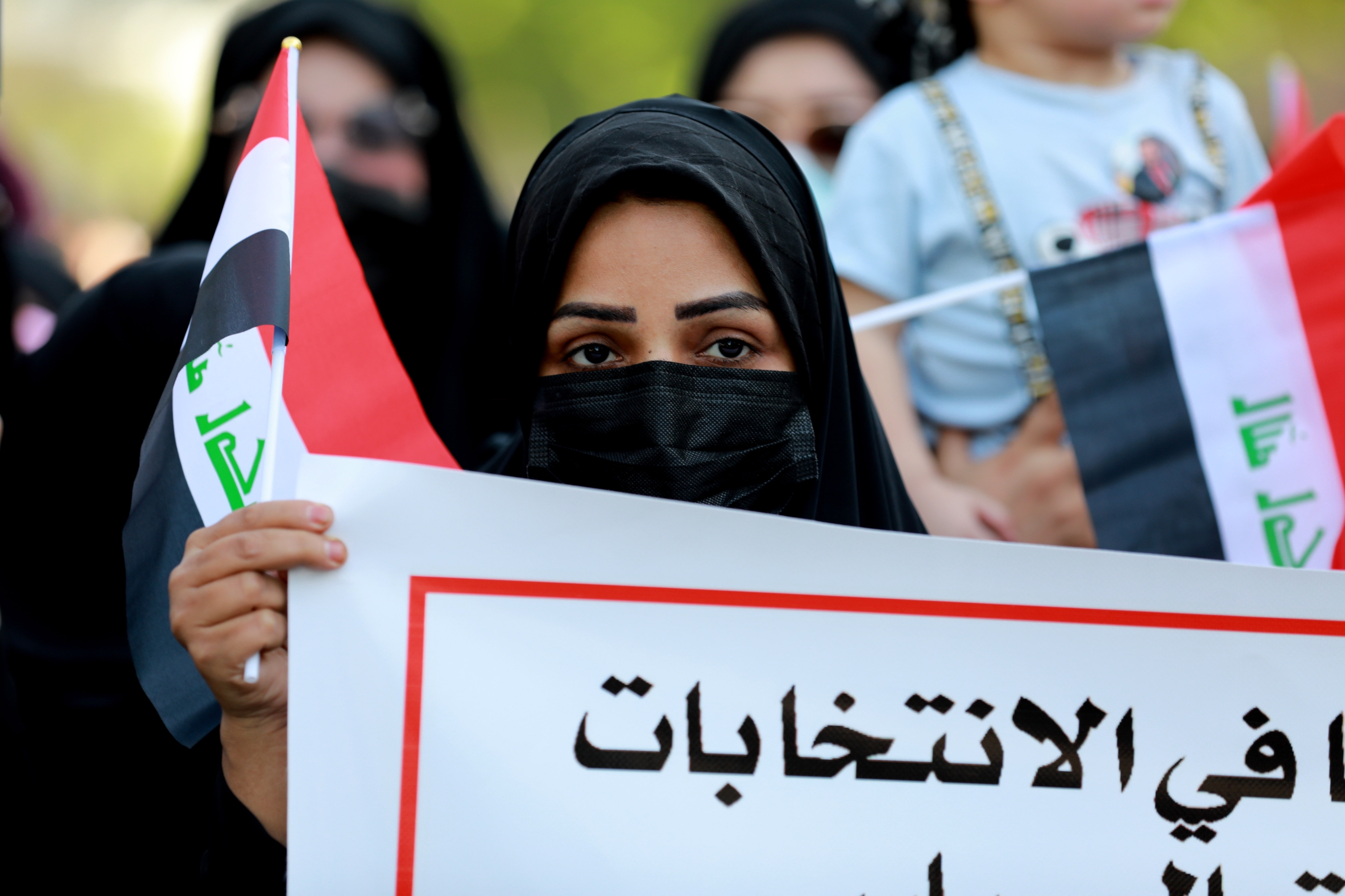
Preliminary results from the Iraqi parliamentary elections have entrenched divisions between Shia political factions which threaten to spark internecine fighting, politicians and observers told MEE.
Thousands of followers of the Iranian-backed Fatah List, which emerged as the biggest loser in the October elections, staged a sit-in in central Baghdad on Tuesday evening, demanding a manual recount of votes.
The Iraqi capital has been tense over the past few days, as several Shia political forces rejected early results - which have so far strengthened the dominance of Shia cleric Muqtada al-Sadr's bloc.
The protesters set up dozens of tents at one of the entrances to the Green Zone, near the Karkh neighbourhood in southern Baghdad, and cut off the main roads leading to the city centre.
New MEE newsletter: Jerusalem Dispatch
Sign up to get the latest insights and analysis on Israel-Palestine, alongside Turkey Unpacked and other MEE newsletters
The Iraqi government put troops on alert and deployed further security forces around the Green Zone, an area which houses most government headquarters and diplomatic missions.
Al-Fatah list, made up from the political wings of several prominent Iran-backed armed factions, including the Badr Organization and Asa'ib Ahl al-Haq, looks set to lose more than half of its seats.
'Our sit-in is an early warning to the Iraqi government... What happened is a betrayal of trust'
- Saeed al-Saray, Huquq secretary-general
The Huquq list, the political wing of Kata'ib Hezbollah, the Shia militia most hostile to the Baghdad government, did not win more than one seat, according to the preliminary results.
"We have doubts and information indicating the occurrence of widespread fraud in the elections, as well as the great confusion that was reflected in the [Electoral] Commission's performance with regard to announcing the results," said Saeed al-Saray, Huquq's secretary-general.
"Our sit-in is an early warning to the Iraqi government. The issue is no longer related to the identity of the loser or the winner. What happened is a betrayal of trust, and the government must hold accountable those involved in betraying this trust."
Results unlikely to change
Tuesday was the last day to file complaints and appeals against the preliminary election results. The Electoral Commission received about 1,400 appeals, according to one of the officials supervising its work.
Although dozens of these appeals are "serious, and are classified as red", Iraqi officials, leaders of political factions and observers do not expect a significant change in the results.
"The elections were clean in general. There were human errors and some technical problems, but they were limited and did not affect the results much," the senior Iraqi official at the Electoral Commission told MEE.
“Most of the complaints submitted are unimportant, but some of the appeals are serious and classified as 'red', but they are limited to small villages or stations and will not change the results much."
If the preliminary results are approved, the grouping with the largest number of seats - currently Sadr's bloc - will name the prime minister and proceed with the formation of the government.
Sadr announced his victory last week and, in a televised speech, called on other winning factions to ally themselves with him and start government negotiations, but he excluded Asa'ib Ahl al-Haq and Kata'ib Hezbollah from the groups he named.
Successful Sadrist candidates also began meeting and communicating with other apparently victorious political groupings to "feel the pulse and find out the possibility of concluding political alliances" that would pave the way for Sadr to obtain the support of an absolute majority in the parliament, one Sadrist leader said.
In a statement broadcast by Sadr's political commission on Monday, the bloc said: "We, the Sadrist bloc, declare our acceptance of these [election] results... and as the largest winning bloc... we will take all legal, constitutional and political steps and measures to protect Iraq's independence, sovereignty and the dignity of its people."
'Playing with fire'
Those sitting at the gates of the Green Zone are members of of Asa'ib Ahl al-Haq, Kata'ib Hezbollah and Jund al-Imam. Although there were no indications of any armed protests, the comments of decision-makers in private and public show a clear concern of an outbreak of fighting among Shia groups.
The Popular Mobilization Authority (PMA), a governmental umbrella covering the paramilitaries, has issued strict instructions to its fighters and employees to refrain from involvement.
A force of hundreds of PMA fighters was deployed on Tuesday in the protest area, forming a separate line between the forces protecting the Green Zone and the sit-in.
'If a single bullet is fired now from any party on the ground, things will get out of control'
- Senior PMA commander
A senior PMA commander close to Iran told MEE that the PMA did not support the escalation and was not involved.
"A number of the faction leaders insisted on escalation. They say that creating controlled chaos would force the government to interfere [in the work of the Electoral Commission] and change some results," he said.
"This is playing with fire. If a single bullet is fired now from any party on the ground, things will get out of control."
He added that the leaders of Al-Fatah and Huquq hadn't managed the election very well and "made a lot of mistakes".
"They have to deal with the consequences away from the street," he said.
Several meetings were held in Baghdad late on Tuesday evening, with some lasting until the early morning hours of Wednesday. It seemed clear by Wednesday evening that the attendees had decided to calm the situation and avoid escalating rhetoric in their speeches.
The most notable meeting was held at the home of Nouri al-Maliki, the former prime minister and the leader of the State of Law bloc. It was attended by the leaders of most Shia political groups, as well as the leaders of the Iran-backed armed factions.
Two separate statements issued on Wednesday by Hadi al-Ameri, the leader of al-Fatah, and Qais al-Khazali, leader of Asaib Ahl al-Haq, said they would be waiting for the results of appeals submitted to IHEC.
Both men invited security forces and protesters to exercise restraint and avoid any destabilisation of the security situation.
"We will not resort to any fighting. We will not close a street and will not collide with the security forces," Saray told MEE.
"If the results are not corrected, the next parliament will be the product of forged elections and will be weak, and the government which will result from the womb of this parliament will not be different."
Middle East Eye delivers independent and unrivalled coverage and analysis of the Middle East, North Africa and beyond. To learn more about republishing this content and the associated fees, please fill out this form. More about MEE can be found here.


